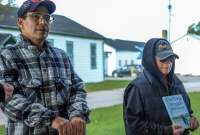Support strong Canadian climate journalism for 2025
Ottawa is built on unceded land, meaning it was never surrendered to Canada in a treaty negotiation. In essence, every building created in the city still sits on Algonquin land, including new community housing.
Now, Ottawa’s largest community housing provider is set to deepen its support of local Indigenous communities through a new community benefits agreement, as well as by integrating Algonquin design elements into a new development.
The community benefits agreement will build on an existing program that is valued at $535,000 annually. It formalizes access to education and employment opportunities for those living in Ottawa community housing. Other cities like Toronto and Vancouver have mandatory community benefits agreements, but the city of Ottawa still lags on the issue.
Benefits agreements enforce a community-centric approach to developments in the city, particularly around employment and procurement from local businesses and projects. In other words, money and resources have to benefit people within a community, especially vulnerable and equity-seeking groups, rather than allowing development to favour others beyond the city’s population.
“[Indigenous Peoples] need more than a free-market solution,” Warren Water, a member of the Ottawa benefits agreement steering committee, said in an interview.
There are no Indigenous-specific programs as part of the benefits agreement, but it will serve vulnerable groups, such as new Canadians, Indigenous Peoples and the LGBTQ2S community, Stéphane Giguère, CEO for the Ottawa Community Housing Corporation (OCHC), said in an interview.
“Together, with our partners, we're continuing to create an inclusive and equitable local economy where everyone thrives,” Giguère said in a press release.
Employment and educational development are central to OCHC’s benefits agreement. One example includes its partnership with Tomorrow’s Trades. The program will offer pre-apprenticeship programs within OCHC’s buildings. Education and community projects can then be conducted side by side, for example — taking care of a building’s retrofit needs or construction of community benches. Then, once a participant finishes a full apprenticeship program, OCHC will welcome them to apply for positions, Giguère said.
“It’s lifting the tide,” Yasir Naqvi, MP for Ottawa Centre, said about the benefits agreement.
However, it’s one of OCHC’s new buildings that opened the corporation to the idea of developing partnerships with an Indigenous community near the city.
The OCHC worked in consultation with the Algonquins of Pikwakanagan First Nation and the Alongquins of Ontario on its new development on Mikinak Road, Giguère said.
The interior and exterior design elements are meant to educate and honour the richness of Algonquin culture and history. Public spaces will be named in Algonquin to honour the Algonquin Nation and educate folks about Algonquin culture. The colour scheme of the development will include seven vibrant colours to reflect each of the Seven Grandfather Teachings, a central component of the Anishinaabe worldview.
There will also be several dedicated units for Indigenous Peoples and families who seek affordable housing inside the building. However, the development isn’t solely for Indigenous Peoples.
The partnership with Pikwakanagan developed out of a need to ensure consultations with local communities, Giguère said. It’s why there will be dedicated units for Indigenous Peoples on Mikinak Road when it finishes in 2024.
“How we build relationships within ourselves is how we honour our community,” Giguère said.
Matteo Cimellaro / Local Journalism Initiative / Canada's National Observer







Comments